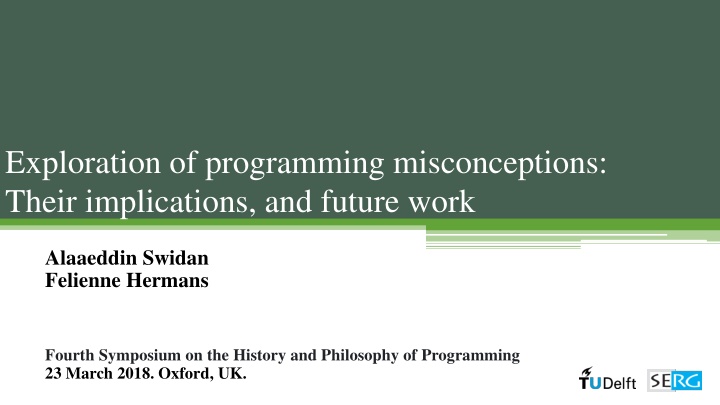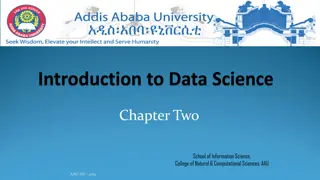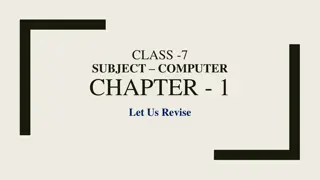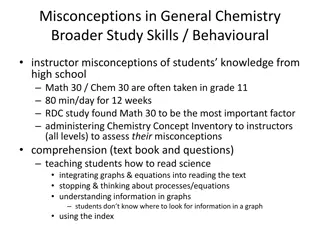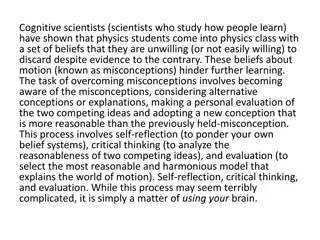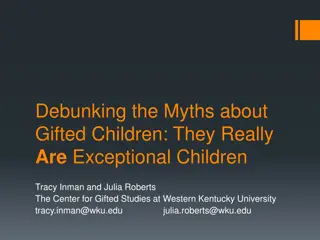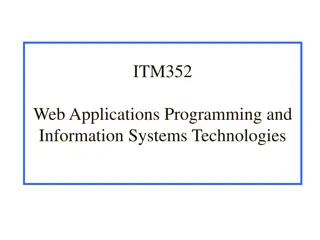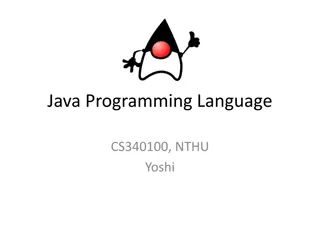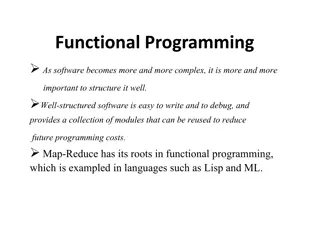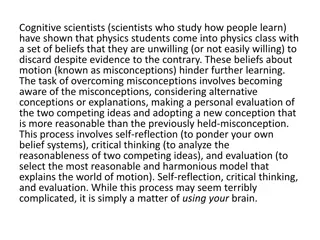Uncovering Misconceptions in Programming Education
Delve into the realm of misconceptions in programming education, exploring their implications and offering insights for future research. Discover the roots of these misunderstandings, their impact on computer science learning, and strategies to address and rectify them.
Download Presentation

Please find below an Image/Link to download the presentation.
The content on the website is provided AS IS for your information and personal use only. It may not be sold, licensed, or shared on other websites without obtaining consent from the author.If you encounter any issues during the download, it is possible that the publisher has removed the file from their server.
You are allowed to download the files provided on this website for personal or commercial use, subject to the condition that they are used lawfully. All files are the property of their respective owners.
The content on the website is provided AS IS for your information and personal use only. It may not be sold, licensed, or shared on other websites without obtaining consent from the author.
E N D
Presentation Transcript
Exploration of programming misconceptions: Their implications, and future work Alaaeddin Swidan Felienne Hermans Fourth Symposium on the History and Philosophy of Programming 23 March 2018. Oxford, UK.
Background Alaaeddin Swidan Bachelor of Computer Engineering MSc. ICT Management Ph.D. candidate @Delft University of Technology Software Engineering Research Group (SERG) Thesis focus: End-users producing software artifacts: challenges, and needed support to better software Supervisors: Dr. Felienne Hermans and Dr. Arie van Deursen
Key elements of the talk Misconceptions in education Definition Programming misconceptions What we know, so far Effect on CS education Counter the misconception Why is it difficult What should we still do?
A misconception is An incorrect understanding of a concept/phenomenon or a set of related concepts/phenomena with the learner s belief that they know how it works from prior knowledge.
Misconceptions in education Existing Knowledge With (Pre-conceptions) Correct Concept No (or partial) understanding New Knowledge Misconceptions: Incorrect understanding + False perception of knowledge
Misconceptions in education Existing phenomena: Day and night, year Correct Concept: A year (~365 days) No (or partial) understanding I do not know? Earth rotation around the sun How much does it take for Earth to go around the Sun? Misconception: Obviously a day
Misconceptions: how they develop The learner relate new knowledge to an observable reality For learners perspective Use of prior knowledge and common sense/logic Generalization Approximation Assumptions For educators: could cause misconceptions: Teaching method: descriptive/over-simplifying Used materials: metaphors and bad examples
Misconceptions in programming education It is difficult to learn programming And to teach it as well Programming Misconceptions is one area of difficulties Programming misconceptions is PL-dependant In some case, paradigm-dependent like OOP Not limited to advances concepts Basic concepts such as: Variables Control flow Sequential nature of execution
Research on programming misconceptions The origin of a misconception is crucial In programming education: similar to other sciences Prior knowledge, common sense, and teaching method A special influence: lack of understanding of the notional machines The notional machine: Introduced by du Boulay[1] Defined as the general properties that a student assumes of the machine executing their code Including the understanding of compiling code, memory management, computer autonomy, and interactivity. [1] B. Du Boulay. 1986. Some Difficulties of Learning to Program. Journal of Educational Computing Research 2, 1 (1986), 57 73.
Examples of programming misconceptions A variable holds multiple values A variable remembers old values Possible answers with misconceptions effect: 10, 20 10 30
Examples of programming misconceptions A variable holds expressions not values Possible answers with misconceptions effect: x+1
Examples of programming misconceptions Difficulty to understand assignment direction Opposite way? Swapping values? Possible answers with misconceptions effect: a=10, b=10 (opposite direction) a=20, b=10 (swap)
Examples of programming misconceptions Condition statements without ELSE stops execution when condition is false Possible answers with misconceptions effect: Prints nothing
Examples of programming misconceptions Loop exits as soon as condition becomes false Adjacent code gets executed Possible answers with misconceptions effect: The count is: 1 The count is: 2 Good bye! The count is: 1 Good bye! The count is: 2 Good bye! The count is: 3 Good bye!
Examples of programming misconceptions Difficulty to recognize the sequence of execution Possible answers with misconceptions effect: 6
Examples of programming misconceptions Difficulty to recognize the sequence of execution Possible misconceptions: Not recognizing the necessity to user-input
Examples of programming misconceptions 162 misconceptions J. Sorva. 2012. Visual program simulation in introductory programming education. http://urn.fi/URN:ISBN:978-952-60-4626-6
Effect of misconceptions Misconceptions increases the sense of programming difficulty Cause direct errors/mistakes in code comprehension and code writing For students and novices: Misconceptions on the long run cause the students to drop programming education (as early as the introductory courses)[2] [2] L. Ma. 2007. Investigating and improving novice programmers mental models of programming concepts. PhD Thesis. University of Strathclyde, UK.
Eliminating the (effect of) misconceptions Challenging characteristics: Misconceptions start early Misconceptions are stubborn and persistent Ego-centric: what I think is important In programming education it is more difficult to identify the origin: Programming involve a great deal of problem solving Exercises require tracing/debugging skills
Eliminating the (effect of) misconceptions Developing teaching approaches and materials that Recognize misconceptions based on age, language/paradigm Contain thoughtful examples [less likely to induce misconceptions] Include guided exploration with enough scaffolding Allow self-observation by students
What is still needed: More focus on visual languages With programming part of school curricula Do VL/Block-based languages induce other misconceptions? Do the children at that age suffer from same/different misconceptions? Do the use of VL induce transfer-misconceptions when moving to textual languages? IDE support to detect and suggest corrections to misconceptions Similar to code smells and refactoring
Thank you! Discuss further ideas and collaborations? Ping me Alaaeddin.Swidan [at] {tudelft.nl | live.com} Twitter: @aeswidan
